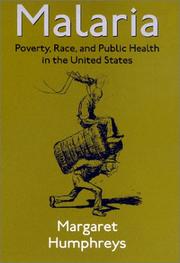| Listing 1 - 4 of 4 |
Sort by
|

ISBN: 0801875994 9780801875991 9780801866371 0801866375 Year: 2001 Publisher: Baltimore Johns Hopkins University Press
Abstract | Keywords | Export | Availability | Bookmark
 Loading...
Loading...Choose an application
- Reference Manager
- EndNote
- RefWorks (Direct export to RefWorks)
In addition Malaria: Poverty, Race, and Public Health in the United States argues that malaria control was central to the evolution of local and federal intervention in public health, and demonstrates the complex interaction between poverty, race, and geography in determining the fate of malaria.
Malaria --- Ague --- Chills and fever --- Intermittent fever --- Malarial fever --- Fever --- Protozoan diseases --- History. --- Public health. --- Community health --- Health services --- Hygiene, Public --- Hygiene, Social --- Public health services --- Public hygiene --- Social hygiene --- Health --- Human services --- Biosecurity --- Health literacy --- Medicine, Preventive --- National health services --- Sanitation
Book
ISBN: 1421410001 9781421410005 9781421409993 1421409992 Year: 2013 Publisher: Baltimore The Johns Hopkins University Press
Abstract | Keywords | Export | Availability | Bookmark
 Loading...
Loading...Choose an application
- Reference Manager
- EndNote
- RefWorks (Direct export to RefWorks)
Medicine and public health clearly advanced during the war--and continued to do so after military hostilities ceased.
Public health --- Medicine, Military --- Community health --- Health services --- Hygiene, Public --- Hygiene, Social --- Public health services --- Public hygiene --- Social hygiene --- Health --- Human services --- Biosecurity --- Health literacy --- Medicine, Preventive --- National health services --- Sanitation --- History --- United States --- Casualties. --- Medical care. --- Casualties (Statistics, etc.) --- Civilian relief
Book
ISBN: 1469680084 1469680068 9781469680088 Year: 2024 Publisher: Chapel Hill : University of North Carolina Press,
Abstract | Keywords | Export | Availability | Bookmark
 Loading...
Loading...Choose an application
- Reference Manager
- EndNote
- RefWorks (Direct export to RefWorks)
This book, authored by Margaret Humphreys, delves into the life and legacy of Dr. J. D. Harris, a remarkable African American physician. It explores his contributions to medicine and society during a transformative period in American history, particularly around the time of the Civil War. The work integrates themes of migration, politics, and medicine, reflecting on Harris's impact as both a physician and a political figure. The narrative is enriched with historical context, highlighting the intersections of race, medicine, and society. The book is intended for readers interested in African American history, medical history, and social change, offering an in-depth look at how one individual's life can reflect broader societal transformations.
Book
ISBN: 9780552163354 Year: 2011 Publisher: London Transworld Publishers
Abstract | Keywords | Export | Availability | Bookmark
 Loading...
Loading...Choose an application
- Reference Manager
- EndNote
- RefWorks (Direct export to RefWorks)
In 1986 Margaret Humphreys, a Nottingham social worker and mother of two, investigated a woman's claim that, aged four, she had been put on a boat to Australia by the British government. At first incredulous, Margaret discovered that this was just the tip of an enormous iceberg. Up to 150,000 children, some as young as three years old, had been deported from children's homes in Britain and shipped off to a 'new life' in distant parts of the Empire, right up until as recently as 1970.Many were told that their parents were dead, and parents often believed that their children had been adopted in Britain. In fact, for many children it was to be a life of horrendous physical and sexual abuse far away from everything they knew. Margaret reveals how she unravelled this shocking secret and how it became her mission to reunite these innocent and unwilling exiles with their families in Britain before it was too late
Kind --- Weeshuis --- Engeland --- Migratie --- Australië --- Adoptie --- Misbruik --- Familieband --- Gezinshereniging
| Listing 1 - 4 of 4 |
Sort by
|

 Search
Search Feedback
Feedback About UniCat
About UniCat  Help
Help News
News